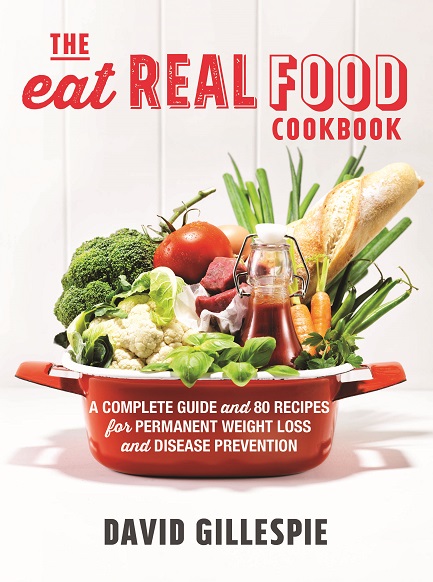
Dietitians are rolling out their ritualistic warnings about ‘fad diets’ so it must be January. Prepare to be warned about the dangers of avoiding gluten, quitting sugar or going Paleo. Instead you will be told to give the new (heavy on whole grains) microbiome diet a go or perhaps become a Vegan.
According to dietitians, crazy ‘fads’ like quitting sugar are dangerous because they ask us to ‘cut out whole food groups.’ Only a dietitian high on sugar would describe sugar as a ‘food group’, but I guess the argument could apply to the stricter forms of paleo which ask devotees to ditch dairy, legumes and grains.
If food group deletion is the reason for official opposition to paleo, gluten free and quitting sugar why are they quite happy to give a free pass to vegetarianism and its more extreme cousin, veganism? Both of these diets do actually cut out food groups and both require careful management in order to avoid significant nutrient deficiencies. But they are never attacked by Dietitians.
Vegetarian diets do not contain meat, poultry or fish. Vegan diets go a little further and also exclude dairy products and eggs. Both diets have been part of British and US culture since the mid-19th century so we’ve had a bit of time to study them in the wild.
Those studies tell us that (compared to omnivores) vegetarian diets provide higher amounts of carbohydrates, omega-6 polyunsaturated fats, fibre, vitamin C, vitamin E and magnesium but lower amounts of protein, saturated fat, omega-3 fats, vitamins A, D and B12 and Zinc. Vegans are usually particularly low in B12 and also Calcium, a deficiency they are likely to share with hard-core paleo enthusiasts because both avoid dairy.
We use vitamin B12 to create our DNA, red blood cells and the myelin insulation around our nerves. Not having enough of it can result in fatigue, weakness, psychiatric problems and anaemia. B12 deficiency in children and the elderly is even more worrying. Studies have consistently shown that children and older people lacking B12 suffer significant cognitive defects such as memory and reasoning.
The lack of long chain omega-3 fats, the abundance of omega-6 fats and deficiencies in the fat soluble vitamins A and D are also serious cause for concern particularly in pregnancy.
This does not mean that vegetarian or vegan diets should not be followed, just that they need to be carefully managed, particularly in pregnant women, children or the elderly. But that is what you might expect from a diet that actually does delete ‘whole food groups.’
So where then are the January warnings to avoid those ‘fad diets’? Why are the dietitians’ scare tactics focused only on diets which might stop people eating grains and legumes? It’s a real conundrum.
Coincidentally, the body that regulates dietitians in Australia is sponsored by Arnott’s, Nestle and the Australian Breakfast Cereal Manufacturers Forum. And while that last one sounds like an almost official body, it’s really just a long-winded way of saying the Breakfast Club. No not that one, this one is responsible for supplying all those sugary boxes of grain we are supposed to consume as part of a ‘balanced breakfast.’ The gang’s all there. Kellogg’s (coincidentally founded because of a vegetarian religion), Freedom, Nestle (again) and Sanitarium (coincidentally founded, and run by, the same vegetarian religion).
But surely that can’t be the answer? Surely dietitians wouldn’t sacrifice their professional integrity just to grasp a few stray dollars from the Breakfast Cereal manufacturers? No, there must be some other reason which is not fathomable to us uninformed masses. Because if that were the case, it would mean dietitians are really just the undercover arm of Nestle (etc)’s marketing departments. And that would spell big legal (not to mention moral) trouble.
If dietitians have really been selling us out to flog processed food, then collectively they would owe this country the hundreds of billions a year spent treating the chronic disease disaster those foods have inflicted. But even more importantly they owe us something that can’t be repaid, our health.
This is not a game. Australians are no longer prepared to accept dietetic advice which is curiously aligned with the interests of the processed food industry rather than what the science tells us. Now would be a good time for the dietitians of Australia to lead, follow or get out of the way. A good start would be to stop telling us that quitting sugar is a ‘fad’ that should be abandoned. And they can hope like crazy that when the lawsuits start, everyone has forgotten their role in the catastrophe which is Australia’s health in the 21st century. I, for one, won’t.
Also published in the Huffington Post

















The medical Profession and Dieticians desperately need to be independent of Drug and Food companies or they will lose respect of the population. This is particularly the case with rapid dissemination of information via the internet and the ability of intelligent lay people to educate themselves. People can research obscure topics to a degree that the average practitioner cannot compete with and the professions need to respect that. Yourself, Gary taubes and Nina Teicholz are examples wrt diet.
Having financial relationships, which often involve personal relationships, with companies that may need to have things said about their products that are not good for business and creates a subconscious tendency to go soft or say nothing, even if this is entirely subconscious. Conflict of interest often operates at a level that is easy to rationalize and because of this people must really be independent. The companies cultivate the relationships for a reason, and the objective of that reason is often not aligned with public interest. The science should speak without concern about what your very friendly drug or food company contact might think. We do need to disconnect education from commercial interest and currently most medical education, and I suspect dietician education has sponsors that would like to soften any negative messages. Fierce independence is the only way to maintain any level of respect by the general population and without that we are ineffective.
Dietitians regurgitate what they’ve been taught. When you’ve been educated by a university who employs professors that have no real experience other than years of teaching…. you get our current problem.
Everyone reads the same ‘science’ over and over and then pat each other on the back. The ship is sinking under the weight of T2DM yet people like dieticians will blame the populace and not the food pyramid, or healthy plate, or heart check, or * insert latest dietician fad here*.
When one can pick up a box of sugar laden cereal and see that it’s “heart healthy” because of some mystical whole grain, you know the entire program is broken.
I’m thankful I found out before I turned 50.
It frustrates me when I hear dieticians saying nonsense like sugar in moderation is part of a healthy diet. I wonder if they also believe smoking or illicit drugs ‘in moderation’ are good for us.
The hypocrisy of their message in relation to their sponsors is staggering.
It is still interesting that in this day and age people would rather get their nutrition advice from a lawyer, chef or some sort of celebrity than an actual health professional… In terms of being a “sell out” did you all not notice that the picture of this post was a cover of a book that is being sold on this very website?
Yes having an affiliation with certain companies does reflect badly on an organisations reputation, but when you actually look past the surface and see what the affiliation entails then you get a better understanding. It comes back to an old saying, don’t judge a book by its cover.
David explains the problem exactly as I would, if I was as eloquent as he. Clearly anyone who would disagree with the sentiments is either a dietitian or in the pay of a food company.
Big difference between “sponsorship” and “partnership”. If you take a look at the DAA website, you will see partnerships with food companies. Not a word on “sponsorship”.
Are you saying that the DAA doesn’t receive money from its ‘partners’?
The DAA website lists folks like Nestlé as “Corporate Partners” and their policy defines that as follows – a definition which definitely suggests a conflict of interest to me if their partners are in the business of making and selling unhealthy food.
Corporate Partnership means a binding legal agreement between DAA and another party
(Corporate Partner) whereby:
1) the Corporate Partner provides DAA with financial or in kind support which helps DAA provide valuable continuing professional education (CPD) opportunities, resources for members and opportunities to promote the profession and to influence food supply; and
2) DAA provides value to Corporate Partners with annual benefits such as communication opportunities, national conference benefits and increases awareness of the Corporate Partner to DAA members
Ironically, the link in the Corporate Partnership and Sponsorship Policy to the Conflict of Interest policy gives to a 404 Page Not Found error!
The points below suggests that they should be considering scientific evidence when promoting a partner – there’s plenty of evidence against sugars and PUFAs, are they including that in their considerations? There’s hope here that partnerships could be dissolved if the evidence is clear.
4) DAA will assess proposed joint public activities involving Corporate Partnerships or sponsorship to ensure, as far as possible, they are truthful, espouse nutrition principles that DAA supports and consistent with current scientific knowledge
5) All Corporate Partnerships are evaluated annually to ensure continuing relevance to DAA’s strategic direction.
I can see you are trying to address serious health concerns, but as a word of advice from a scientist. Take a hypothesis from finding a correlation then test that hypothesis in patients before drawing a conclusion. A great scientist never assumes…